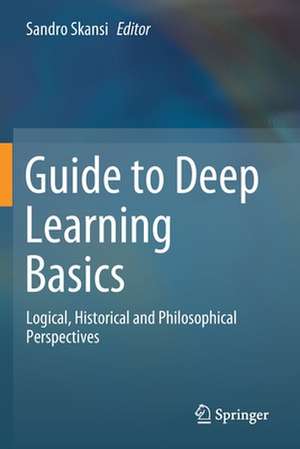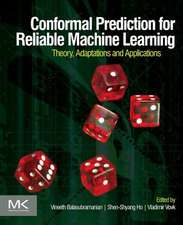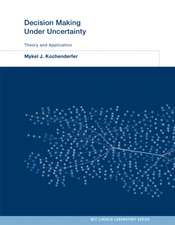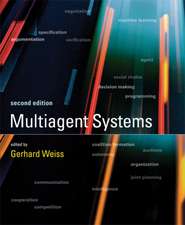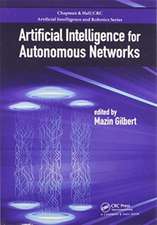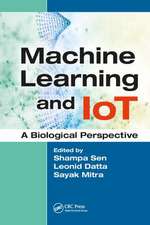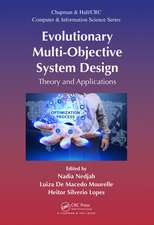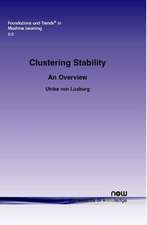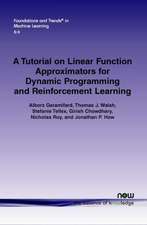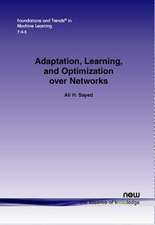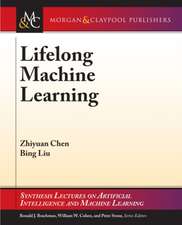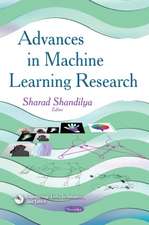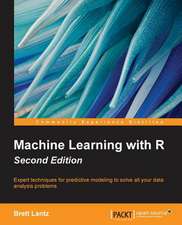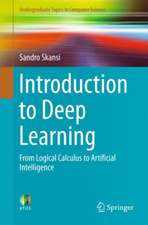Guide to Deep Learning Basics: Logical, Historical and Philosophical Perspectives
Editat de Sandro Skansien Limba Engleză Paperback – 24 ian 2021
Topics and features:
- Provides a brief history of mathematical logic, and discusses the critical role of philosophy, psychology, and neuroscience in the history of AI
- Presents a philosophical case for the use of fuzzy logic approaches in AI
- Investigates the similarities and differences between the Word2vec word embedding algorithm, and the ideas of Wittgenstein and Firth on linguistics
- Examines how developments in machine learning provide insights into the philosophical challenge of justifying inductive inferences
- Debates, with reference to philosophical anthropology, whether an advanced general artificial intelligence might be considered as a living being
- Investigates the issue of computational complexity through deep-learning strategies for understanding AI-complete problems and developing strong AI
- Explores philosophical questions at the intersection of AI and transhumanism
| Toate formatele și edițiile | Preț | Express |
|---|---|---|
| Paperback (1) | 638.21 lei 43-57 zile | |
| Springer International Publishing – 24 ian 2021 | 638.21 lei 43-57 zile | |
| Hardback (1) | 593.53 lei 38-44 zile | |
| Springer International Publishing – 24 ian 2020 | 593.53 lei 38-44 zile |
Preț: 638.21 lei
Preț vechi: 797.77 lei
-20% Nou
Puncte Express: 957
Preț estimativ în valută:
122.13€ • 126.74$ • 102.08£
122.13€ • 126.74$ • 102.08£
Carte tipărită la comandă
Livrare economică 17-31 martie
Preluare comenzi: 021 569.72.76
Specificații
ISBN-13: 9783030375935
ISBN-10: 3030375935
Ilustrații: VIII, 140 p. 12 illus., 4 illus. in color.
Dimensiuni: 155 x 235 mm
Greutate: 0.22 kg
Ediția:1st ed. 2020
Editura: Springer International Publishing
Colecția Springer
Locul publicării:Cham, Switzerland
ISBN-10: 3030375935
Ilustrații: VIII, 140 p. 12 illus., 4 illus. in color.
Dimensiuni: 155 x 235 mm
Greutate: 0.22 kg
Ediția:1st ed. 2020
Editura: Springer International Publishing
Colecția Springer
Locul publicării:Cham, Switzerland
Cuprins
Mathematical Logic: Mathematics of Logic or Logic Of Mathematics?.- The McCulloch–Pitts Paper from the Perspective of Mathematical Logic.- From the Linguistic Turn to the Cognitive Turn and Back Again.- Why not Fuzzy Logic?.- Meaning as Use: From Wittgenstein to Google’s Word2Vec.- Rudolf Carnap, the Grandfather of Artificial Neural Networks: The Influence of Carnap’s Philosophy on Walter Pitts.- A Lost Croatian Cybernetic Machine Translation Program.- The Architecture of Geoffrey Hinton.- Machine Learning and the Philosophical Problems of Induction.- The Artificial Intelligence Singularity: What it Is and What it Is Not.- AI-Completeness: Using Deep Learning to Eliminate the Human Factor.- Transhumanism and Artificial Intelligence: Philosophical Aspects.
Notă biografică
Dr. Sandro Skansi is an Assistant Professor of Logic at the University of Zagreb, Croatia.
Textul de pe ultima copertă
This stimulating text/reference presents a philosophical exploration of the conceptual foundations of deep learning, presenting enlightening perspectives that encompass such diverse disciplines as computer science, mathematics, logic, psychology, and cognitive science. The text also highlights select topics from the fascinating history of this exciting field, including the pioneering work of Rudolf Carnap, Warren McCulloch, Walter Pitts, Bulcsú László, and Geoffrey Hinton.
Topics and features:
Dr. Sandro Skansi is an Assistant Professor of Logic at the University of Zagreb, Croatia.
Topics and features:
- Provides a brief history of mathematical logic, and discusses the critical role of philosophy, psychology, and neuroscience in the history of AI
- Presents a philosophical case for the use of fuzzy logic approaches in AI
- Investigates the similarities and differences between the Word2vec word embedding algorithm, and the ideas of Wittgenstein and Firth on linguistics
- Examines how developments in machine learning provide insights into thephilosophical challenge of justifying inductive inferences
- Debates, with reference to philosophical anthropology, whether an advanced general artificial intelligence might be considered as a living being
- Investigates the issue of computational complexity through deep-learning strategies for understanding AI-complete problems and developing strong AI
- Explores philosophical questions at the intersection of AI and transhumanism
Dr. Sandro Skansi is an Assistant Professor of Logic at the University of Zagreb, Croatia.
Caracteristici
Presents unique perspectives on ideas in deep learning and artificial intelligence, and their historical and philosophical roots Offers an introduction to cognitive aspects of deep learning, including those which are not tackled by existing deep learning applications but currently exist only as ideas Highlights the roots of deep learning in philosophical and psychological concepts, which may also have a substantial impact on future developments in the field
